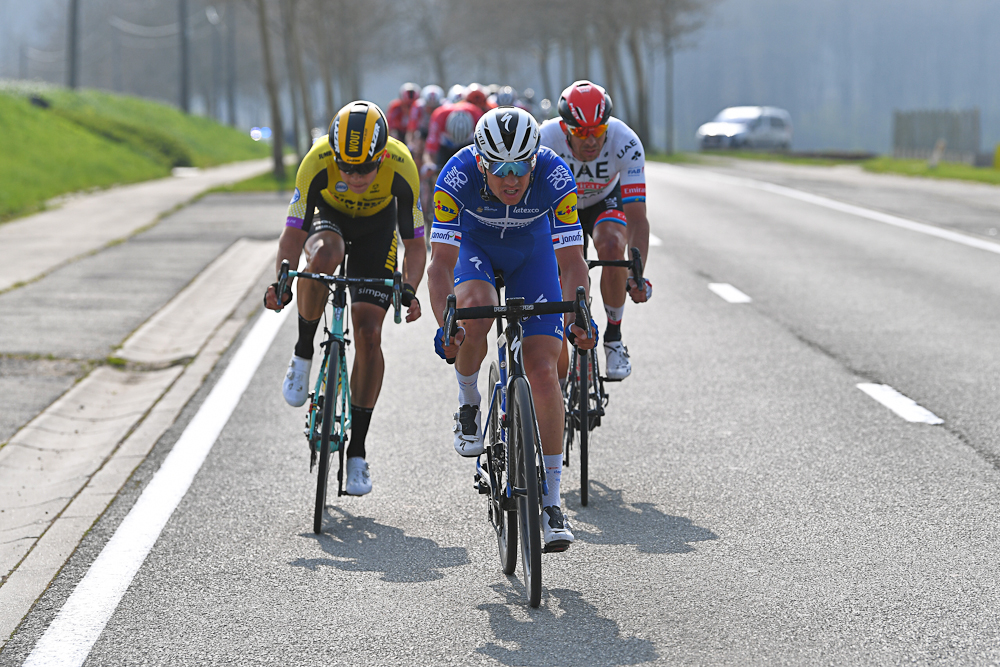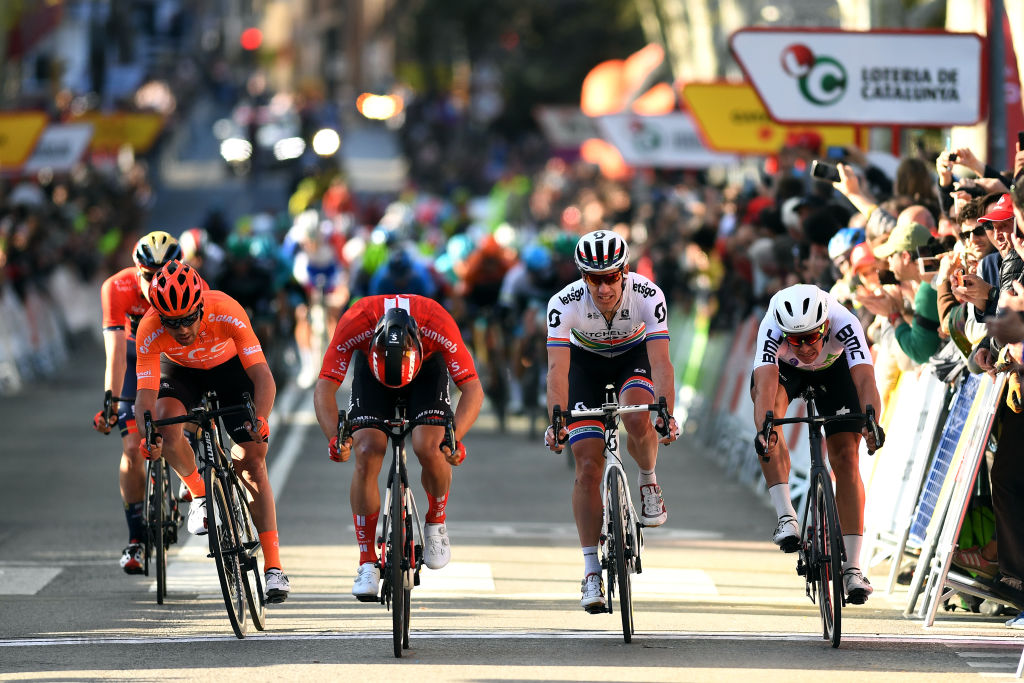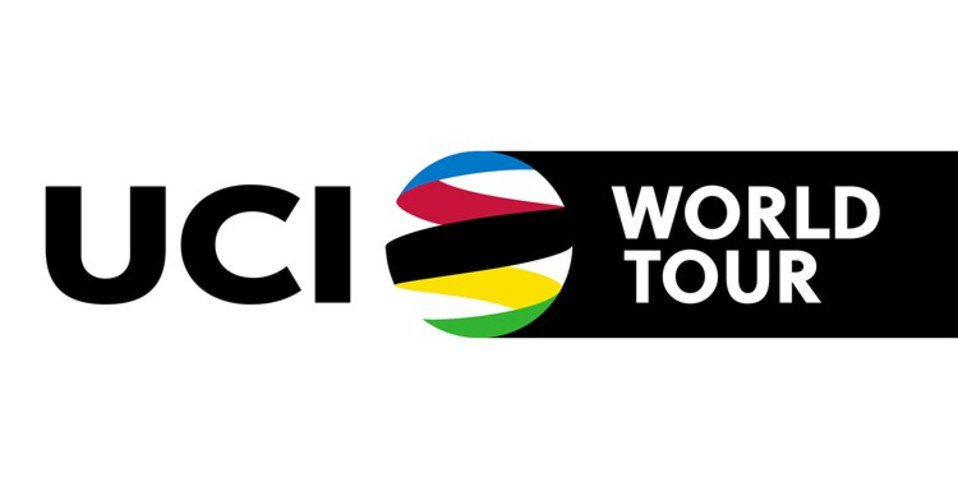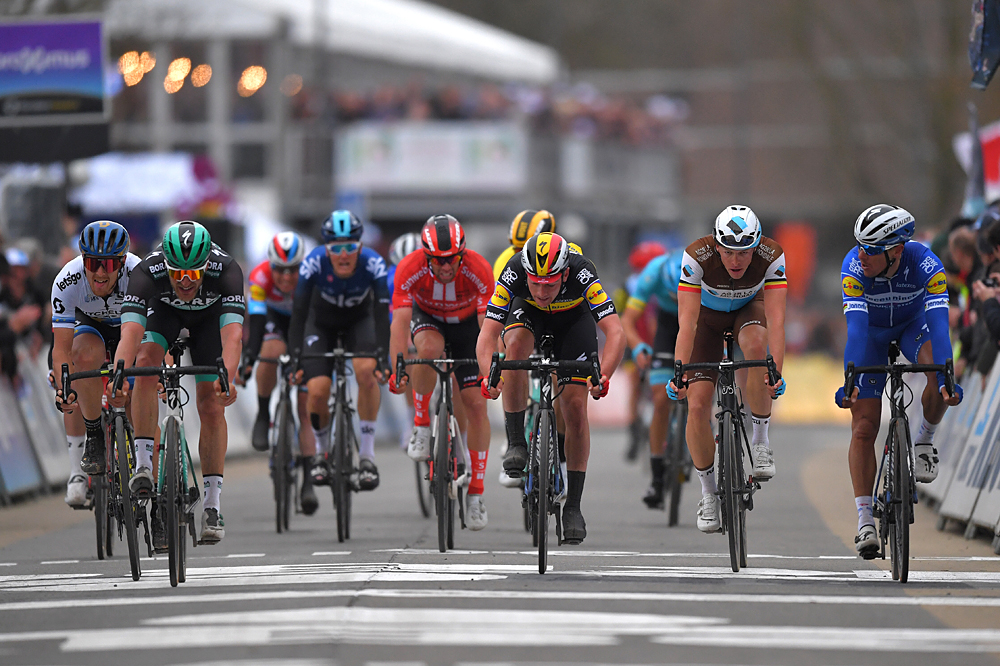Exclusive: Risk of legal challenge leads UCI to expand WorldTour to 20 teams
Three-year team ranking to decide which of 23 teams secure final places




The Union Cycliste International (UCI) has changed the rules of the men's WorldTour series to avoid the risk of a possible legal challenge, allowing up to 20 teams to be part of the sport's most prestigious division between 2020 and 2022.
Teams had to confirm their intent to be part of the next three-year phase of the WorldTour before April 1. On Tuesday the UCI confirmed that the current 18 WorldTour teams and five Professional Continental teams (Arkea Samsic, B&B Hotels Vital Concept, Cofidis, Direct Energie and Israel Cycling Academy) have confirmed their interest in applying for a WorldTour licence for the next three-year phase of the UCI WorldTour. This will create a battle for the final places based largely on the sporting criteria of rider points scored during the 2017, 2018 and 2019 seasons.
Without the rule change to allow up to 20 teams, the lowest ranked existing WorldTour teams risked relegation from the 2020-2022 WorldTour.
WorldTour status guarantees the teams a place in all the major races, including the Tour de France, while the Professional Continental teams are forced to fight for the remaining wildcard invitations. Many WorldTour title sponsorship contracts insist on having a place at the Tour de France, meaning relegation from the WorldTour can lead to the collapse of a team.
Cyclingnews has discovered that the significant rule changes were made at a meeting of the UCI's Professional Cycling Council on January 31. The UCI has since updated its rule book but has not yet given any detailed explanation or rationale behind the changes. The PCC includes UCI management and representatives from the teams, race organisers and riders and is entrusted with the technical and administrative organisation of the men’s WorldTour. The PCC agreed to change the rules, allowing up to 20 WorldTour teams, via a simple majority vote as per its terms of reference.
The men’s WorldTour has included 18 teams in recent years, with that number always planned for the next phase of the WorldTour as part of UCI president David Lappartient’s reforms agreed at last year's World Championships in Innsbruck.
Documents issued to teams and race organisers as late as December of last year clearly indicated the new WorldTour would include 18 teams, with the qualifying sporting criteria based on the points scored by the 10 best riders of each team during the 2017, 2018 and 2019 seasons. Teams also have to satisfy ethical, financial, organisational and administrative rules when they apply for WorldTour places in the autumn.
Get The Leadout Newsletter
The latest race content, interviews, features, reviews and expert buying guides, direct to your inbox!
Retroactive points system leaves UCI open to potential legal challenge
Cyclingnews understands from speaking to a number of stakeholders in the sport, who did not want to be identified, that it is the retroactive points scoring system that could leave the UCI open to a possible legal challenge.
Teams raced the 2017 and 2018 seasons without knowing the importance of the ranking points because the sporting criteria for the 2020-2022 WorldTour places had yet to be finalised. Some teams only began to focus on scoring as many points as possible, and hired riders to do so, in recent months.
The global governing body appears to have quickly pushed through the rule change, adding a codicil to its rules that will allow up to 20 teams in the 2020-2022 men’s WorldTour. Sources tell Cyclingnews that the reason for the rule change is to avoid any risk of a legal challenge, which could have delayed the 2020 WorldTour reforms and led to huge embarrassment for the UCI.
When contacted by Cyclingnews regarding the rule changes, the UCI said in a statement: “The sporting criterion is an important element of the new regulations of the UCI WorldTour as it will help determine the UCI WorldTeams for the three-year period from 2020 to 2022.
"The UCI has worked closely with all stakeholders of men’s professional cycling on this topic. This decision was agreed during the recent Professional Cycling Council meeting in January where all stakeholders are represented."
The carefully rewritten new rules mean only existing WorldTour teams and not existing Professional Continental teams can secure the 19th or 20th places. By allowing up to 20 teams, the UCI allows for two teams to be promoted to the WorldTour from the Professional Continental ranks but saves the lowest ranked WorldTour team from the risk of relegation.
Arkea Samsic, B&B Hotels Vital Concept, Cofidis, Direct Energie and Israel Cycling Academy have all confirmed their intention to secure a place in the WorldTour for 2020-2022, sparking a fight for the final places. It appears that Androni Giocattoli and Wanty Groupe-Gobert do not intend to try to step up to WorldTour status for 2020.
The three-year sporting criteria
The UCI has opted not to publish the three-year points totals that will decide the sporting criteria for the 2020-2022 WorldTour. However, Cyclingnews has seen the three-year points ranking calculated by a data company for a leading WorldTour team.
The 2017 and 2018 points totals have created the following ranking:
1. Deceuninck-QuickStep 29,478
16. EF Education First 12,595
17. Katusha-Alpecin 11,307
18. Cofidis 9,493
19. Wanty Groupe Gobert 8,881
20. Dimension Data 7,569
Androni Giocattoli, Direct Energie, Israel Cycling Project and Arkea-Samsic have lesser points totals.
Those points totals suggest that if the qualification rules for 2020-2022 WorldTour had not been changed to allow up to 20 teams, then Katusha-Alpecin or Dimension Data would have risked being relegated from the WorldTour at the end of the 2019 season.
The new rules save the current WorldTour teams from relegation if they stay within the top 20 in the team ranking.
Dimension Data knows it has to fight for every possible ranking point and have recently targeted the South African national championships and the African championships to score as many points as possible. However they have struggled in WorldTour races, with Mark Cavendish still not back to his best. Katusha-Alpecin is hoping that Marcel Kittel can rediscover his sprinting skills and that Ilnur Zakarin is consistent in stage races and Grand Tours to boost the team’s points total.
Cofidis, Direct Energie, Israel Cycling Academy and Arkea-Samsic are fighting to score as many points as they can in 2019 to give them a chance of becoming one of the two Professional Continental teams to step up to the WorldTour in 2020.
Direct Energie signed Tour of Flanders winner Niki Terpstra for 2019. The points he scored in 2017 and 2018 remain with his previous team but any points his scores in 2019 will help Direct Energie fight for a place in the WorldTour as French oil and gas company Total step in as title sponsor.
Back to 18 WorldTour teams in 2023
The rule changes for 2020-2022 have avoided the possible relegation of two current UCI WorldTour teams but only delayed the risk of relegation, kicking the problem down the road. The stakeholders have agreed that the 2023 WorldTour will include only 18 teams, meaning up to two teams could be relegated from the WorldTour in 2023.
The possibility of having up to 20 teams in the 2020-2022 UCI WorldTour will also impact other new UCI’s rules, introduced just a few months ago, concerning Professional Continental teams and the compulsory invitations to WorldTour races.
The UCI has told Cyclingnews that Grand Tour organisers will still be able to award two wild card places to teams but the two automatic places that were due to be awarded to the two best-ranked Professional Continental teams are now at risk and will be cancelled if 20 WorldTour places are awarded.

Stephen is one of the most experienced member of the Cyclingnews team, having reported on professional cycling since 1994. He has been Head of News at Cyclingnews since 2022, before which he held the position of European editor since 2012 and previously worked for Reuters, Shift Active Media, and CyclingWeekly, among other publications.